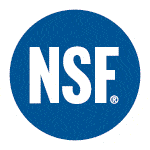
Omni International Corp. is proud to meet the rigorous standards of NSF International Protocol P155 and offer several NSF-certified food service gloves.
But not everyone knows who NSF International is, what protocol P155 entails, and what it means for consumers and businesses.
In today’s post, we’ll explore NSF International Protocol P155 and how it affects food service gloves so that you can understand why it’s important and what the NSF certification mark really means.
What is NSF International?
Founded in 1944, NSF International is a not-for-profit, non-governmental organization. They are the leading global supplier of public health and safety-based risk management services.
NSF services include product certification and safety audits for the food and water industries. In addition, NSF is a Pan American Health Organization/World Health Organization Collaborating Center on Food Safety, Water Quality and Indoor Environment.
While focusing on food, water, indoor air, and the environment, NSF develops national standards, provides learning opportunities through its Center for Public Health Education, and provides third-party conformity assessment services while representing the interests of all stakeholders. The primary stakeholder groups include industry, the regulatory community, and the public at large.
NSF is widely recognized for its scientific and technical expertise in the health and environmental sciences. Its professional staff includes engineers, chemists, toxicologists, and environmental health professionals with broad experience both in public and private organizations.
Offering services in more than 170 countries, NSF is headquartered in Ann Arbor, Michigan. The NSF mark is recognized for its value in international trade around the world.
What is NSF International Protocol P155?
This protocol covers disposable single-task gloves typically used for food handling, preparation, and service tasks. The P155 protocol establishes criteria for product quality in terms of toxicology (indirect food additive), physical properties (tensile strength, elongation), barrier resistance (leakage), and sanitation (bioburden).
The criteria in the protocol are divided into general requirements for all gloves and material-specific requirements that apply to the major material types used in food contact gloves: polyethylene, vinyl, natural rubber latex, nitrile, and other synthetic blends.
As new materials are developed in the industry, material-specific requirements may be added in subsequent revisions of the protocol.
Also, while new test methods and regulatory requirements (e.g., ASTM, FDA, etc.) are developed dealing with durability or other product quality parameters, they may be added as well, in consultation with an expert panel consisting of health officials, manufacturers, users, and other stakeholders.
Omni International Corp.’s NSF Certifications
Omni International takes great pride in product quality. To further demonstrate this commitment to quality, Omni International’s products are produced in ISO 9001:2015-certified manufacturing plants, which verifies that operational and customer-related processes are controlled, measured, and consistently monitored.
As part of our commitment to provide quality products, value, service and innovation, Omni International Corp. decided to take our gloves to a higher level of reassurance a few years ago.
The first step in this endeavor was pursuing NSF Certifications for our food service gloves.
To obtain NSF Certifications, Omni was required to meet all requirements outlined in P155, which requires new test methods and auditing for food glove manufacturers.
By combining medical glove guidelines and food specific requirements, P155 ensures safety, durability, and cleanliness of disposable single-task gloves used in food handling and preparation.
“Disposable gloves, which did not meet medical grade requirements, were commonly used in food service,” said Tom Bruursema, the former general manager at NSF Engineering and Research Services. “With P155, regulators, manufacturers and consumers can now look for the NSF mark to ensure glove quality.”
Products certified to P155 bear the NSF mark to demonstrate compliance with all of the P155 requirements. Annual product testing and facility audits are conducted to ensure ongoing confidence in gloves bearing the mark.

